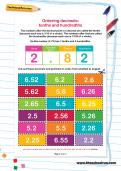How your Year 4 child develops

For many families, Year 3 is a difficult year, full of moodiness, complaints and aggression. But as your child enters Year 4, you’re likely to see the light at the end of the tunnel. Between the ages of eight and nine, many children suddenly seem to grow up, and become much more reasonable and agreeable as a result.
What’s going on in there?
Your year 4 child is a sociable being. “Your child is becoming more independent and is starting to make their own social plans which may not involve you, except as a taxi driver,” says chartered educational psychologist Julia Busch Hansen. Your child makes new friends easily, and is likely to have a close knit group of friends, with whom they’ll share secrets and dirty jokes and will often be silly and giggly. Your child probably also has a best friend of the same sex.
Your eight- to nine-year-old is branching out away from the family, and is likely to consider family outings and meals ‘boring’. They’ll also argue with you and refuse your requests, but nevertheless, they still crave your love and understanding, and like to be rewarded for good behaviour.


Start the Year 4 Learning Programme!
- Weekly maths & English worksheets direct to your inbox
- Follows the National Curriculum
- Keeps your child's learning on track
While your Year 4 child can be rude, bossy and demanding, in general, they’re cheerful, outgoing and affectionate. Your child is sometimes sensitive and melodramatic, and can be overly self-critical, but is less of a worrier than a year ago. Their fears are fewer and more reasonable, and they’re highly articulate in expressing what’s on their mind.
“At this stage it’s important to continue with activities outside school,” says chartered educational psychologist and educational adviser Susan Brooks. “Success in these extra-curricular activities can be extremely important at this age, especially for children who are not excelling academically.”
Potential pressure points
Because your Year 4 child is such a sociable creature, many of the pressures they’re under at this age are likely to relate to his friendships, such as:
- wanting to be part of a group, and feeling hurt if left out.
- wanting to try lots of new extracurricular groups and activities.
- comparing themselves to other children and becoming more competitive in terms of who has the best birthday party, the best bike, and so on.
- gaining a better understanding of humour: their jokes may be hurtful, and they’re also easily hurt by others.
- needing to feel successful, especially in the classroom.
Warning signs to watch out for
At this age, your child can express themselves clearly and verbalise emotions easily, which can make it easier to understand what they’re feeling. But watch out for signs of stress, such as:
- not being able to get to sleep, or having bad dreams.
- constant run-ins with friends, including bullying.
- being secretive and withdrawn.
- being negative about themselves and their achievements.
- not wanting to go to school.
- anxiety about not doing well enough at school.

Give your child a headstart
- FREE articles & expert information
- FREE resources & activities
- FREE homework help








